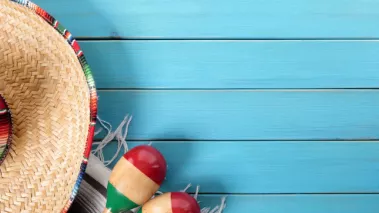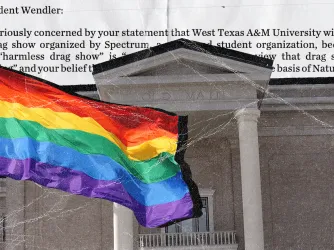Table of Contents
Bowdoin College: When It Comes to Sombreros, Do As We Say, Not As We Do (Or We’ll Kick You Out of Your Dorm)

Bowdoin College—which only last year held an event offering sombreros for alumni to wear in photobooth pictures—is cracking down on students who attended a party last month where some attendees wore tiny sombreros.
The event, a birthday party with a “tequila” theme, has provoked a backlash at Bowdoin, and attendees have been accused of “an act of ethnic stereotyping” by Dean of Students Tim Foster. Two other recent parties had already created controversies over racial insensitivity on campus. In 2015, Bowdoin’s sailing team held a “gangster” party that led to discussions about racism on campus, and in 2014, the lacrosse team held a “Cracksgiving” party that resulted in disciplinary action for some attendees dressed as Native Americans.
At a February 24 Bowdoin Student Government (BSG) meeting, students discussed their anger over the tequila party and rumors that BSG members had been in attendance. Students said that the event was insulting, especially because it was part of a trend of offensive parties that relied on cultural stereotypes as party themes. In response, the BSG passed a statement of solidarity “to stand by all students who were affected” and provided recommendations for how the college should respond. According to student newspaper The Bowdoin Orient, the BSG asked “that the administration address bias incidents and the hurt caused by them more quickly and that the College develop a standardized process for punishing students involved in these incidents.”
And that’s not all: On March 2, the BSG formally introduced articles of impeachment against two student government representatives who attended the party. They are accused of violating the BSG’s non-discrimination policy and of committing “injurious actions to other members of the General Assembly.” The impeachment proceedings, originally scheduled for March 6, have been postponed until BSG clarifies its policies on impeachment in a process scheduled to take place this week.
An Empty Promise
While the student government may be able to punish its members for offensive expression under its by-laws, the college—if it abides by its own policies—cannot. In its Freedom of Speech and Political Activity policy, Bowdoin promises its students that “[p]reservation of freedom of speech is a primary task of the College; the right to express both popular and unpopular views is to be protected.”
This appears to be an empty promise; Bowdoin’s administration has acceded to student demands for punishment of their peers. According to the Orient, one of the party’s hosts “has been placed on social probation until March 2017, must participate in an educational program and Active Bystander Training, must move out of her room in Stowe Hall into Chamberlain Hall and has been banned from Ivies-related events and Spring Gala.” Social probation has other serious ramifications for students, including a ban in participating in the college’s Off-Campus Study program, and a possible referral to the Judicial Board “in the event of any further serious violations, which could result in suspension or dismissal.”
Another student photographed wearing a sombrero at the party was also placed on social probation. And The Washington Post’s Catherine Rampell reports that multiple party hosts were kicked out of their dorm rooms.
Bowdoin College’s Hypocrisy
Rampell also reports that after she initially wrote about the tequila party and the ensuing controversy and punishments, a Bowdoin graduate contacted her and explained that at an alumni reunion last year, the college provided attendees with a photobooth and costume garb, including fake mustaches and various hats—sombreros among them. Pictures of the event are still available on Bowdoin’s Facebook page, and on the Bowdoin Reunion Instagram account. Costume items, including a sombrero hat, are pictured in a post captioned “Put on a silly hat and come to the Smith Union for the #bowdoinreunion photo booth!”
It’s difficult to imagine how Bowdoin can reconcile its punishment of students who wore tiny sombreros with the fact that just last year, the university itself took part in the “ethnic stereotyping” for which it has condemned its students. This is a stunning act of hypocrisy: Bowdoin has punished students for engaging in the same expression as their own college.
But the story gets even more absurd. On the same night as the tequila party, Bowdoin held its annual “Cold War” party, where students dress in fur hats and coats. Is this cultural appropriation? Would Bowdoin students face punishment for hosting a party of this nature not sanctioned by the college? The answer to those questions is not evident, and Bowdoin’s message to students appears to be: Do as we say, not as we do.
In a post answering the question “Why write about tiny sombreros?”, Rampell explains that controversies like this offer a “teachable moment”:
And that is the point: Questions such as “what counts as cultural appropriation, and under what circumstances?” deserve to be debated, probed, openly discussed, with an assumption of good faith among all parties to the discussion. They do not deserve to be settled via a disciplinary decision suddenly handed down from on high that will mar these students’ transcripts and potentially hurt their future employment. And that seems to be what happened here. Bowdoin’s administration pretended as if there were clear social norms that students should have known to abide by, even as the administration itself actively muddied those norms.
This controversy was a chance for a “teachable moment”; instead the students are being socially, politically and even residentially purged, without much chance to defend their actions or — should they ultimately be deemed indefensible — at least learn from them. Tied up in this campus controversy is a moral question, and also a pedagogical one.
Are themed events, like tequila parties or Cold War parties, offensive examples of cultural appropriation? As Rampell points out, that’s a question that should be met with discussion. Students do not need administrators to answer—with disciplinary action—questions they are capable of debating amongst themselves.
Perhaps Bowdoin students should also discuss whether it’s acceptable for a college to punish expression it officially sanctioned only a year ago.
Lastly, Bowdoin administrators have a lot to learn if they believe punishment is the best way to counter offensive expression. Though Bowdoin is a private college not bound by the First Amendment, their own policy enshrines free expression, stating that “[f]ree speech is a constitutional right in a democratic society and a cornerstone of intellectual life at Bowdoin.” But when Bowdoin punishes students for hosting a party that offends other students, they fail to practice what they preach—demonstrating instead that controversial ideas will be met with censorship.
Recent Articles
Get the latest free speech news and analysis from FIRE.

FIRE statement on President Trump’s executive order to outlaw flag burning

Chinese officials force censorship of Thai gallery’s art exhibit about authoritarianism (proving the exhibit’s point)

The findings against Harvard are a blueprint for a National Campus Speech Code
